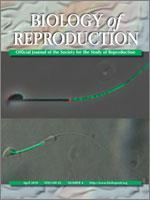Conditional ablation of Indian hedgehog (Ihh) in the murine uterus results in mice that are sterile because of defects in embryo implantation. We performed microarray analysis on these mice at the time point at which the Ihh target genes are induced by the administration of exogenous hormone to mimic Day 3.5 of pregnancy. This analysis identified 863 genes altered by the conditional ablation of Ihh. Of these, genes that regulated the cell cycle were overrepresented. In addition, genes involved in epidermal growth factor (EGF) and estrogen (E2) signaling were found to be deregulated upon Ihh ablation. Furthermore, upon conditional ablation of Ihh, 15-mo-old mice exhibited hallmarks of estrogenized uteri, such as cystically dilated glands and hyalinized stroma. Thus, Ihh regulates embryo implantation by having an impact on the cell cycle, EGF signaling, and E2 signaling.
How to translate text using browser tools
7 January 2010
Ablation of Indian Hedgehog in the Murine Uterus Results in Decreased Cell Cycle Progression, Aberrant Epidermal Growth Factor Signaling, and Increased Estrogen Signaling
Heather L. Franco,
Kevin Y. Lee,
Russell R. Broaddus,
Lisa D. White,
Beate Lanske,
John P. Lydon,
Jae-Wook Jeong,
Francesco J. DeMayo
ACCESS THE FULL ARTICLE

Biology of Reproduction
Vol. 82 • No. 4
April 2010
Vol. 82 • No. 4
April 2010
estrogen
implantation
Indian Hedgehog
Mouse
uterus




